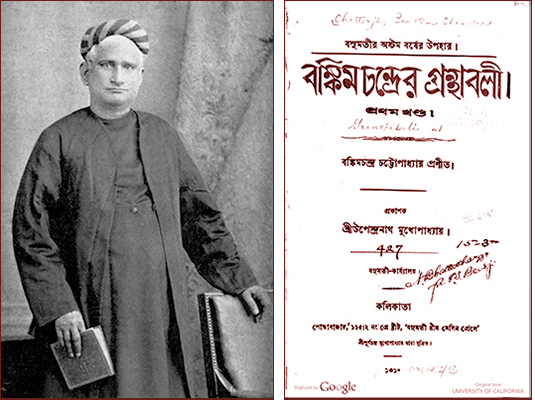55 Bengali

Bankimacandra Cattopadhyaya (1838-1894) was not only the very first novelist of the Bengali language but is also considered one of its greatest. He wrote the first novel in Bengali as well as the first novel in English by an Indian. His works are still avidly read and a poem in his historical novel Anandamatha titled “Vande Matram” (“Hail Mother”) so inspired Indian freedom fighters it was officially adopted as India’s national song (not the same as the national anthem which is a poem by Tagore).
Bankim was born in a Brahim family, and grew up in the town of Midnapur where his father worked for the colonial government. After his education Bankim followed his father into civil service while at the same time pursuing a successful literary career. Starting with poetry he turned towards writing novels. His first published novel, Rajmohan’s Wife, was composed in English. However, he soon turned to Bengali and in 1865 published the very first novel in the language called, Durgesanandini (“Daughter of the Lord of the Fort”). He continued to write novels as well as satirical and humorous sketches. A commentary he wrote on the Gita was published posthumously.
Outside Bengal, his historical novel Anandamatha (“The Monastery of Bliss”), published in 1882, became the most famous and somewhat controversial for its attitude towards Muslims. It is set during the Fakir Rebellion of the late 18th century when Bengalis rose up against the oppressive rule of the East India Company during a famine. As mentioned above, it contains an ode to the motherland conceived as a goddess titled “Vande Matram” that became very popular with Indian freedom fighters during the struggle for independence. Bankim’s political stances got him in trouble with British authorities in his own lifetime, but in 1894 —t he same year he died — Queen Victoria made him a Companion of the Order of the Indian Empire.
Bankim belonged to a generation of Bengalis who had grown up under British rule and were able to reflect on the massive changes that rule had brought. The generation immediately before his had been the first to be exposed to western and modern ideas, and many of them accepted them with enthusiasm while others did so reluctantly. While Bankim did not question the adoption of western and modern ideas and technologies, he and members of his generation were more familiar with them and were in a position to critically judge the promises the British had made to Indians about the benefits of European rule and civilization. At the same time they had gained the confidence to appreciate aspects of their Indian and Hindu heritage which they wanted to hold onto as they modernized. Apart from their literary merits, these are some of the themes that make Bankim’s works relevant to this day.
Bengali, or Bangla to its nearly 230 million speakers, is an Indo-Aryan language belonging to the Indo-European family of languages. It is the official and predominant language of Bangladesh and the Indian state of West Bengal, and also has many speakers in the neighboring Indian states of Tripura and Assam. With a rich and centuries old literary tradition it continues to be a major language of modern South Asia. At UC Berkeley, introductory and intermediate Bengali is taught through the Department of South & Southeast Asian Studies.
Contribution by Adnan Malik
Curator and Cataloger for the South Asia Collection
South/Southeast Asia Library
Title in English: Collected Works
Authors: Caṭṭopādhyāẏa, Baṅkimacandra, 1838-1894.
Imprint: Kalikata : Upendra Nath Mukhopadhyaya, Basu Mati Office, 1310-11 [1892/93-93/94].
Edition: 1st
Language: Bengali
Language Family: Indo-European, Indo-Aryan
Source: HathiTrust Digital Library (UC Berkeley)
URL: https://hdl.handle.net/2027/uc1.b000571754
Other online editions:
- Bankim Rachanabali (volume 1 of complete works in Bengali), Internet Archive (Digital Library of India)
- The Abbey of Bliss (English translation of Anandamath), Internet Archive (British Library)
Select print editions at Berkeley:
- Granthabali. Kalikata : Upendra Nath Mukhopadhyaya, Basu Mati Office, 1310-11 [1892/93-93/94].

